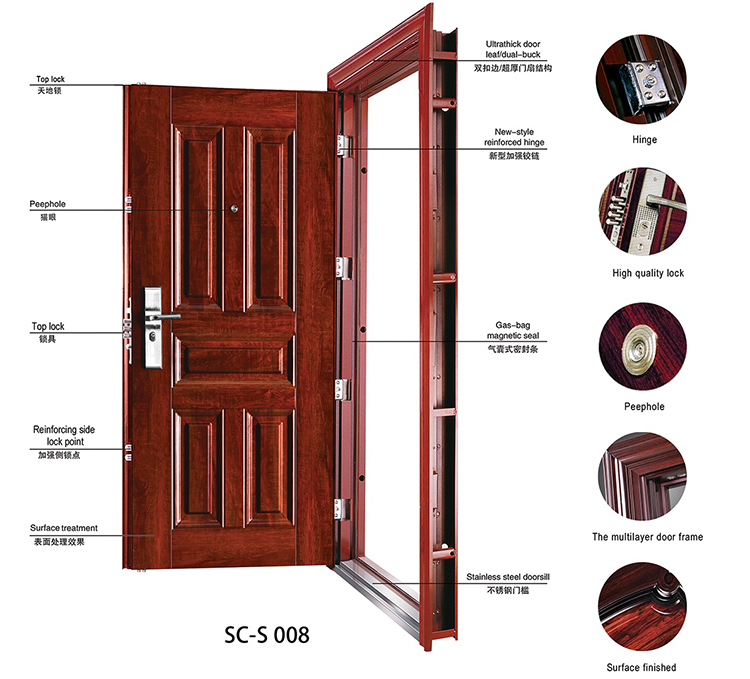The Unbeatable Protection of Fireproof Doors for Hospitals: Safeguarding Patients and Staff
Good quality fireproof doors for hospitals are important because hospitals are complex environments that require specialized safety measures to protect patients and staff. One of the most critical components of hospital safety is the installation of fireproof doors. These doors are essential in containing fires and smoke, establishing safe evacuation routes, and safeguarding vulnerable patients and critical infrastructure. In this blog post, we will explore the unbeatable protection of fireproof doors for hospitals and how they ensure patient safety.
1. The Importance of Fireproof Doors for Hospitals
Hospitals are high-risk environments for fires due to the presence of flammable materials, electrical equipment, and vulnerable patients. Fireproof doors are an essential safety measure that can help prevent or minimize the impact of a fire emergency.
Fireproof doors for hospitals are designed to meet specific fire resistance ratings, indicating the duration they can withstand the spread of fire and smoke. Compliance with these regulations ensures that hospitals are equipped with the necessary fire safety measures to protect patients, staff, and visitors.
2. Containment of Fire and Smoke
Fireproof doors for hospitals are designed to contain fire and smoke within specific areas, preventing their rapid spread throughout the building. By compartmentalizing the fire, these doors help to limit its impact and provide additional time for evacuation and emergency response.
These doors are constructed with fire-resistant materials, such as steel or composite materials, which have been tested and certified for their ability to withstand high temperatures. They are equipped with intumescent seals that expand when exposed to heat, effectively sealing off the gaps between the door and the frame, preventing the passage of smoke and flames.
3. Evacuation Routes and Emergency Exits
In the event of a fire, quick and efficient evacuation is crucial. Fireproof doors for hospitals play a vital role in establishing safe evacuation routes and ensuring the availability of emergency exits.
These doors are strategically installed along evacuation routes and near emergency exits to facilitate the orderly and swift evacuation of patients, staff, and visitors. They are designed to remain operational even in the presence of intense heat, allowing individuals to pass through them to reach safety.
Furthermore, fireproof doors for hospitals are equipped with panic hardware, such as push bars or crash bars, to ensure easy and rapid egress during an emergency. This feature is particularly important in a hospital setting where patients may have limited mobility or require assistance.
4. Protection of Vulnerable Patients
Hospitals care for a wide range of patients, including those who are immobile, critically ill, or undergoing medical procedures. Fireproof doors for hospitals provide a crucial layer of protection for these vulnerable individuals.
In the event of a fire, fire-rated doors act as a barrier, preventing the rapid spread of flames and smoke to patient areas. This containment allows medical staff to safely evacuate patients or relocate them to designated safe areas, minimizing their exposure to fire hazards.
Additionally, fireproof doors for hospitals are equipped with vision panels or windows, allowing medical staff to visually monitor patients in adjacent areas during an emergency. This feature ensures that patients receive the necessary care and attention while evacuation procedures are underway.
5. Protection of Critical Hospital Infrastructure
Hospitals house critical infrastructure, including medical equipment, patient records, and essential utilities. Fireproof doors for hospitals play a crucial role in safeguarding these vital assets from the destructive effects of fire.
By containing the fire within specific areas, fire-rated doors help to prevent the spread of flames and smoke to critical infrastructure locations. This containment minimizes the risk of damage to medical equipment, preserves patient records, and ensures the uninterrupted functioning of essential utilities such as power and water supply.
6.Integration with Fire Detection and Suppression Systems
Fireproof doors for hospitals are often integrated with advanced fire detection and suppression systems, further enhancing their effectiveness in protecting patients, staff, and infrastructure. These systems include smoke detectors, fire alarms, and sprinkler systems designed to detect a fire early and trigger automatic responses to suppress it.
Fireproof doors are equipped with electromagnetic door closers that ensure the door remains closed at all times, preventing the spread of smoke and flames. These closers are connected to the fire alarm system and release the door in the event of an emergency, allowing for easy and rapid evacuation.
In addition, fireproof doors can be integrated with automatic fire suppression systems, such as water mist or gas suppression systems. These systems release a fine mist or gas that extinguishes the fire, minimizing damage and reducing the risk of injury or loss of life.
7. Maintenance and Testing of Fireproof Doors
Fireproof doors require regular maintenance and testing to ensure their continued effectiveness in protecting hospitals from fire hazards. Hospitals should establish a maintenance and testing schedule for fire-rated doors in accordance with regulatory requirements.
Maintenance includes regular inspection of the door and frame, checking the condition of seals and hardware, and ensuring that the door operates smoothly. Testing involves subjecting the door to a fire resistance test, which measures its ability to withstand fire and smoke.
Regular maintenance and testing of fireproof doors ensure that they remain in optimal condition and provide the necessary protection in the event of a fire emergency.
8. The Expertise of Sun City in Fireproof Doors for Hospitals
At Sun City, we specialize in crafting high-quality fireproof doors that meet the stringent requirements of hospitals and other healthcare facilities. With years of experience in the industry, we understand the unique challenges and safety considerations of hospital environments.
Our fireproof doors for hospitals are meticulously designed and manufactured using top-grade materials to ensure maximum fire resistance and durability. We offer a wide range of door styles, sizes, and finishes to suit the specific needs and aesthetics of each hospital.
Our team of experts is dedicated to providing exceptional service, from helping you select the perfect door to ensure a seamless installation process. We prioritize the safety and well-being of your hospital and are committed to delivering high-quality fireproof doors that offer unbeatable protection.
Fireproof doors are a crucial component of hospital safety, providing unbeatable protection and safeguarding patients and staff in the event of a fire emergency. These doors contain fire and smoke, establish safe evacuation routes, and protect critical infrastructure. By integrating with advanced fire detection and suppression systems and undergoing regular maintenance and testing, fireproof doors ensure their continued effectiveness.
When it comes to fireproof doors for hospitals, Sun City is the trusted choice. We offer high-quality, custom-crafted doors that meet the stringent requirements of healthcare facilities. Invest in the safety and well-being of your hospital by choosing Sun City for your fireproof door needs. Contact us today to explore our wide range of options and take the first step towards ensuring the utmost protection for your patients, staff, and infrastructure.





